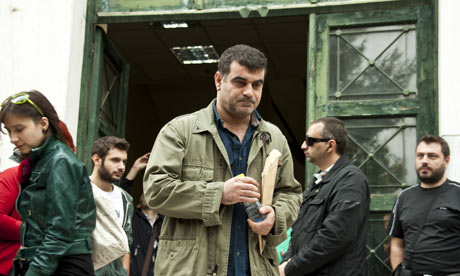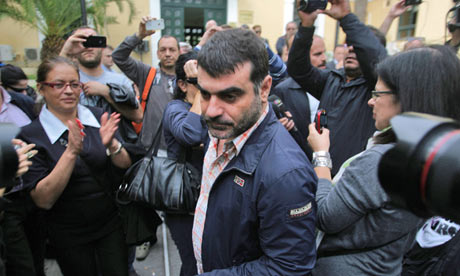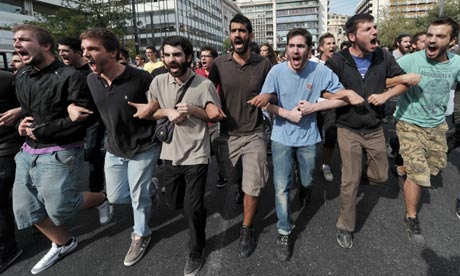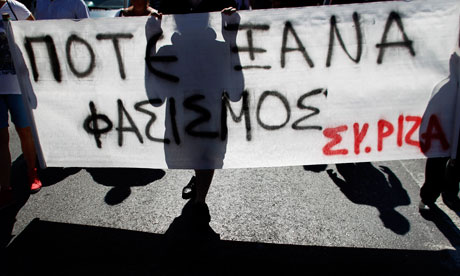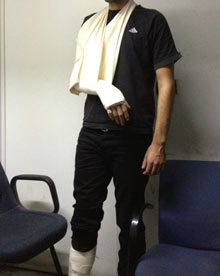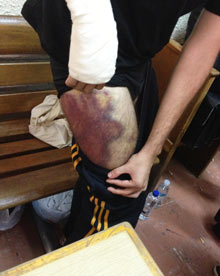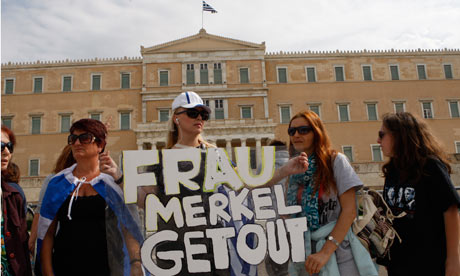Heroes of Modernity: The Greek Military Junta of 1967-1974
When one sees the years the military government ruled in Greece, one can see why this particular sort of rule was important, necessary and why the Regime was despised with such vehemence. Like all such governments the Greek military revolt came in the wake of failed liberal democracy, chaotic public morals and a general decline of civilized behavior, not to mention the disintegration of the economy and a drying up of the valuable tourist trade. Military leaders considered themselves the only source of rectifying the situation, and hence took action. Their accomplishments and rationale have yet to be defended in English.
I. The Background
After the Second World War, Greece was a major battle ground between the forces of Stalin and that of Greek tradition and Orthodoxy. The vary fact that every single article written on this coup refers to “communists” rather than Stalinists is telling. These were not Menshiviks, but the most murderous group in history, in the USSR, responsible for upwards of 30 million deaths. Greece, was therefore, in a fight for its life. Has the Stalinists taken over, millions of Greeks would have been liquidated. This was the nature of the battle, and a major Civil War broke out between Greek patriots and Stalin-backed rebels that only ended close to 1950. Of course, there would have been no support whatsoever for Stalin had the wartime government of Greece ben even remotely competent in dealing with the economy. Inflation skyrocketed and bred discontent among the normally conservative Greek population. All in all, the Stalinists were relatively small–being able to field about 10,000 men, though of differing nationalities–though lavishly funded from abroad, both from Yugoslavia and the USSR. When Stalin broke with Belgrade, much of the Marxist’s funding was cut off, thereby leaving their organizations to wither, and proving, incidentally, they had little internal support.
Greece was considered a major prize for Stalin. She is strategically located and possessed of much natural wealth. Thankfully, Stalin failed, and the Greek anti-communists defeated Stalin’s rebel forces in 1949. However, it was made clear that some of the western powers, though often enamored with Stalin, were dedicated to protecting Greek sovereignty, and the British were instrumental in organizing certain elements in the Greek military forces; elements, with rather divergent political outlooks, in order to protect Greek independence from the USSR and her imperialist agenda under Stalin.
Unsurprisingly, Greek Stalinists were banned and many were forced to leave the country. Establishment sources considered this a “persecution” of the communists, but considering the agenda of Stalin, it was a mere act of self-defense, and a rather pallid one at that.
Regardless, it became clear that the Greek military was a conservative institution, though it was equally clear that not all officers were. The top brass of the Greek armed forces were conservative in the general sense of that word, most of whom cut their teeth fighting Stalin and his imperialist designs. In the early 1960s, after years of conservative governments (normally led by the National Radical Union, a strongly popular anti-communist party) elected by the Greek people, a liberal republican was elected, the ill-fated and pompous George Papandreou, Sr. This occurred after the assassination of the even more pompous George Lambrakis, a self-styled pacifist who had no difficulty with Stalin’s aggression. This assassination was considered shocking to the Greek people, who reacted and elected a slightly more liberal parliament. The significance of Lambrakis was that his funeral led to large leftist demonstrations, as the left had regrouped after the military victory of the Greek nation in the late 1940s. Now, the Greek military needed to deal with violent demonstrations led by unrepresentative elements from the Greek population. Certainly, given the time period in the mid-1960s, the Regime was up to something, and the world was beginning to feel the dawn of the famed Aquarian Age.
The “constitutional crisis” came to a head when the liberals, now running Greece, clashed with the moderately conservative king, Constantine II. With a few defections from Papandreou’s side, the king was able to bring down his government, while the king himself struggled to form a few of his own, with little success. Strong leadership was necessary, and none was forthcoming. Papandreou, for his part, made no secret of his republicanism, and hence, his desire to radically restructure Greece’s rather popular style of government. Papandreou provoked the king with his tirades against monarchy, and thus bears full responsibility for the constitutional crisis, a crisis one might say certainly crossed the prime minister’s mind.
In Greek politics at the time, it was generally agreed that the king had full charge of the army, which in leftist eyes, was a major problem in that the coercive power was in his hands. With all things leftist, the world is about power and the fulfillment of their ideological fantasies, and therefore, a constitutional crisis needed to be provoked to destroy the monarchy and thus bring the army into their control. Therefore, Papandreou, in the fit of anger, demanded to be appointed defense minister–guaranteeing that the left would achieve its goal–the army always being a thorn in the left’s side. The king, as all knew, refused, and eventually accepted the resignation of Papandreou from his post as prime minister.
Just as significant, strikes and street protests developed, supporting one or the other side in this scandal, as it became clear liberal democracy had failed. The king’s governments could not stand, and the parliament, as well as the people, were split. The slight majority of the liberals was ended by the defection of a few of his “apostates” (as they are called), leading to a situation where a basic 50-50 split ensued. Certain leftists, in other words, could not abide the arrogance of Papandreou. No government, it seemed, could receive a vote of confidence, and the Greek economy began to suffer as a result of the political instability. By 1967, governments were lasting a week or so and the country was sinking into poverty and hyperinflation; unemployment was rising and out of control, and investment was drying up due to high rates of interest.
What happened alarmed the world: The major liberal party, without a shred of scruple, formed an alliance with the Socialist Party, considered by many to be a cover for the banned Communist Party, which even liberal historians think is true, at least in the fact that the ancient Stalinists were supporting the Socialists openly. Since no party could form a government by itself, such a solution was considered proper, and the more conservative elements of the Greek population were aghast.
Therefore, very quickly, the notion of a communist threat was made clear. Since, by this time, in 1967, Marxism was responsible for the deaths of 30 million in the USSR and another 30 million in China, such a threat was severe indeed (in fact, 1967 was the midst of the “Cultural Revolution” in China). It was this that led to the coup of 1967.
II. The Coup
Democracy had failed–again. A split population, an obvious decline in public morals, a failing economy, strikes and street protests, squabbling politicians, pompous speech making, institutionalized lying, threats, and endless other problems created by the democratic system had the Greek people outraged, and the coup was received with cheers from the population, as is normal and ordinary for these sorts of events.
The Coup took place on April 21, 1967, just short of the elections that everyone knew would be inconsequential and simply prolong the agony that had become Greece. Arrogant politicians were arrested en masse as the creators of Greek poverty and misery. It should be noted that the officers that took over were relatively low ranking, as far as these things go. Two Colonels were the leaders, Nikolas Makarezos and the undisputed leader George Papadoupolos. One general was involved, Brigadier Stylanos Pattakos, but he was a minor figure behind the colonels. It is also worth noting that these men were populists by conviction, considering the political crisis to have been created by corrupt politicians out of touch with Greek life, a sentiment echoes by the overwhelming majority of the population, regardless of background. This included the king, with Papadoupolos considered to be too young for the job, though the Colonels respected the institution of monarchy in general.
Most of the coup’s members were of the agricultural classes and looked to the city with disdain. For them, the city was the basis of corruption, big money and oppression. As always, the Establishment, both left and right, was close to big money and was thus an urban phenomenon. Therefore, in the propaganda war, the military did not have a chance in terms of elite public opinion. True to their populism, the first to be arrested was the chief of the army, a very cosmopolitan figure, General George Spantidakis. Unsurprisingly, the U.S. immediately condemned the coup, referring to it as a “rape of democracy.” The coup itself was supported by lower level officers and rejected by the upper brass, including all politicians, who saw their power ebbing away to the increasingly wild cheers of the population.
The Colonels, effectively arrested the generals, a military and political move with social and economic effects. This was a populist move, and was meant to signal that the nation of Greece will no longer be an oligarchy. The policies initiated by the Colonels bears this notion out. The king, isolated and surrounded by sympathetic military leaders, was forced to legalize this government (which improved the military’s imag in the eyes of the population). Relations between the monarchy and Papadoupoulos were extremely poor, though the Colonels were monarchists in theory.
The monarchy, as a result, attempted to oust the Colonels from power. The plan was simple: Constantine was to fly to the north (near Salonika, significantly the Jewish capital of the Balkans), with a military force loyal to him. The Navy and Air Corps strongly supported the king, at least at the higher levels. The king sought to create an alternative northern government and receive international recognition as a result. The result was unfortunate for Constantine: the army was split, the lower level officers refused the commands of loyal generals stationed in Salonika, and the king’s plans failed. Generals were arrested by lower level officers and these officers then took control over their units; Constantine went into exile in Rome.
It is widely admitted that CIA cash was placed on Constantine’s movement. U.S. foreign policy in such areas is normally (such as in El Salvador) to split the difference between two movements. On the one hand, finance does not like nationalist movements, but they also do not like many forms of Marxism (though this is not universally true, as in South Africa or Namibia). Therefore, the Regime usually places its bet on the center, whatever that might be. Duarte’s party in Salvador, Constantine in Greece.
The junta, or the Revolutionary Council, as they termed themselves, faced opposition from the United States, the middle classes (read urban intellectuals and businessmen) and international finance. They were strongly supported by labor and, especially, agriculture. Even the worst enemy of the Council accepts this as a fact. In the 1970s, Papadopoulos established a new constitution that made Greece a republic. Unfortunately, what brought the Council down was an invasion of Cyprus by Turkish troops. Some believe that this was a NATO concept to destroy the Council, but more others claim that this was a result of the support of right-wing paramilitaries in Cyprus by the Greek junta. Either way, this invasion was a victory for the Turks, and was a major setback for the junta.
III. The Successes of the Revolutionary Council
The name the Colonels gave to themselves was not mere rhetoric. These men were ideologically driven in the best of senses, as they saw Greece government by a small urban clique allied with international finance and capitalism. They saw, as a result, the despoliation of labor and agriculture, both created and resulting from the disastrous economic policies of the previous democratic oligarchy. Regardless of one’s view of the coup itself, the fact remains that the Colonels remained consistently popular with the broad masses of the population until the Turkish invasion of Cyprus in 1973. A hostile critic of the junta writes this:
To gain support for his rule, Papadopoulos was able to project an image that appealed to some segments of Greek society. The son of a poor family from a rural area, he had no education other than that of the military academy. He publicly stated contempt for the urban, western-educated "elite" in Athens. Modern western music was banned from the airwaves, and folk music and arts were promoted. The poor, conservative, religious farmers widely supported him, seeing in his rough mannerisms, simplistic speeches, even in his name ("Georgios Papadopoulos" is one of the most common names in Greece) a "friend of the common man". Further, the regime promoted a policy of economic development in rural areas, which were mostly neglected by the previous governments, that had focused largely in urban industrial development.
Colonel Papadopoulos was a man of his word. Outside of the hostile rhetoric of this critic, the fact is that the Colonel was disgusted at the obvious connection between democracy (in the vulgar sense of the term) and oligarchy. This is seen everywhere modern liberal democracy has been tried.. It is the ideology of the rich and the official ideology of international finance. It is even the case that many in the middle class, at least in the 1960-s, were convinced that the military government was better than that embarrassment of liberal democracy, overseen by a young and inexperienced monarch.
The greatest achievement of the coup was in economic growth and development. Greece is poor. It is one of the poorest countries in Europe. Under democracy, the economy stagnated, and Greece experienced high interest rates, high unemployment and negative economic growth. Foreign investment proceeded apace, but those profits went abroad. Under the Colonels, all of this was reversed. Another hostile critic of the Junta says this, no doubt while gritting his teeth: “The 1967 - 1973 period was marked by high rates of economic growth coupled with low inflation and low unemployment. GDP growth was driven by investment in the tourism industry, public spending, and pro-business incentives that fostered both domestic and foreign capital spending.” This is the primary reason why the Council maintained the popularity of the general population. Another reason is that the communists were thrown in prison by the thousands. As they were (at least at one time) planning in creating a GULAG system in Greece, it is little wonder.
Additionally, the Junta is aware of the hippie movement, supported by capital in the US. It banned this particular elite social experiment it, as did Franco’s Spain, with both governments, incidentally, blaming US policy for this social invasion.
Here is an example of a movement banned in Greece by the Junta, proving its popularity. There was a rock group known as “Aphrodite’s Child” in Greece at the time, they were banned and forced to flee to Paris, no doubt to the cheers of the agricultural classes in the country. Here is one write up about the band:
The rock group Aphrodite's Child began in Greece in the sixties. Bass-player and singer Demis Roussos was a member of The Idols and We Five, while keyboardest Vangelis Papathanassiou was a member of The Forminx who had several hits in Athens in 1964 and 1965, playing British invasion influenced rock. In 1968 during the dictatorship, Vangelis, Demis and drummer Lucas Sideras left Greece for England where being a rock band is less oppressive. They don't even get in the country due to problems with work permits and end up in Paris. It works out for them. The band puts out an album and several of the songs rise to #1 on the French charts. It seems everything they touch turns to gold and each release becomes a hit. In 1970 they begin their most ambitious work, a double album based on the Book of Revelations called 666. The record company is horrified by the contents, in particular a song in which actress Irini Pappas simulates (or maybe it's not simulated) masturbation. Vangelis refuses to remove the offending track and the record company delays the album's release.
This is first, clearly against the social interest of Greece, and it, more significantly, is clearly the result of western pressure, where such ideologies have derived from American sources. This is the sort of trash the junta was set at destroying, and is another major source of the Council’s popularity. All of this material is coming in through U.S. official sources, specifically the U.S. military radio station AFRS. The Council responds to all of this by drafting the offending kids into the army. This simple, country sort of approach is part of Papadopoulos’ appeal. The single best aspect of Junta policy, however, was the treatment of agriculture. Papadopoulos’ was the son of a poor farmer, and he knew first hand the contempt that urban politicians hold the farmers in. During the democratic oligarchy (called “democracy” in the west) farming was a dangerous occupation. Much like in America, farmers were going into bankruptcy in large numbers. They had the utmost contempt for bankers and leftists, but certainly had no truck with the “conservatives” represented by Constantine and “moderate” elements. The Revolutionary Council maintained a rock solid popularity from agriculture, still in 1970 the largest aspect of the Greek nation.
First, the Greek government under the Colonels cancelled most agricultural debt, being careful to distinguish family farms from western-owned combines by limiting the amount of money to be written off, numbering about $100,000, a large sum, but too small for large combines and agri-business. Second, some support for struggling farmers is sent. Third, it becomes easier for farming families to send their children to college, and they are given free textbooks. In fact, all college students are given free books and reduced tuition. College students, as usual, respond with riots and well rehearsed condemnations of “militarism.” For tourist development, extremely low interest loans were granted by the junta. The financial community went bonkers. For small business start ups, the same sort of loans were granted. But much of this liquidity was reserved for tourism, which had fallen off under the oligarchy. Unfortunately, the oil shock negated many of these gains, though this is no the fault of the regime, and much public support was lost by the end of the system in 1974.
Insofar as finance is concerned, this might well be the central issue. Greece under the junta was quite willing to back out of the U.S., liberal dominated global trading order by making sure the Greek currency remained unconvertable, hence unaffected by "market" pressures. As soon as the west's puppet Papandreou returned to take the helm from his posh post at Harvard, his first act was to render the currency "floatable," and hence vulnerable to outside manipulation.
IV. Conclusion
The Greek military moved in the late 1960s for a few reasons: primarily, it moved so as to end the absurd stalemate in the Greek parliament. Secondly, to stop the re-legalization of Marxism in Greece through the liberals bringing to power of the Socialist Party. Third, the failing economy was destroying Greece, embarrassing her worldwide. Fourth, the military moved because of the destruction of Greek Orthodox morals among the young population, particular from official US sources blaring music and jokes designed to offend conservative Greek sensibilities. And fifth, the military moved to take power to rescue the pathetic condition of the farmers, drowning in debt. If these are the reasons, then the junta succeeded, and maintained a strong and prosperous Greece while they were in power. The Council failed due to reasons beyond its immediate control, the situation in Cyprus and the oil shock of the early 1970s. Without these, Greece would be a freer country today.
V. Select Bibliography
E. O'Ballance, The Greek Civil War, 1944-49 (1966)
G. Finlay, A History of Greece (7 vol., 1877; repr. 1970)
A. G. Papandreou, Democracy at Gunpoint (1970)
D. Dakin, The Unification of Greece: 1770-1923 (1972)
D. Eudes, The Kapetanios, Partisans and Civil War in Greece, 1943-1949 (tr., 1972)
A. F. Freris, The Greek Economy in the Twentieth Century (1986)
T. Bahcheli, Greek-Turkish Relations Since 1955 (1988)
R. Clogg, A Short History of Modern Greece (1988)
Y. A. Kourvetaris and B. A. Dobratz, A Profile of Modern Greece (1988)
J. V. Kofas, Intervention and Underdevelopment: Greece During the Cold War (1989)
T. Boatswain and C. Nicolson, A Traveller's History of Greece (1990).
![The [Greek] European Tragedy](https://blogger.googleusercontent.com/img/b/R29vZ2xl/AVvXsEiWKI5s90SFm1wWTk6bs4p7CgslaC2SnYPsrZhb-B-smOufNNCSxCvpBLI9hOB-LsXZjir_PNmEiMk2-E62F3xkg96IoC6QFAaZAnPRTVH340IN9WBRmWJqPkjWlgyRj3zpALp7h6hvA58/s920/GkBack_new.jpg)
